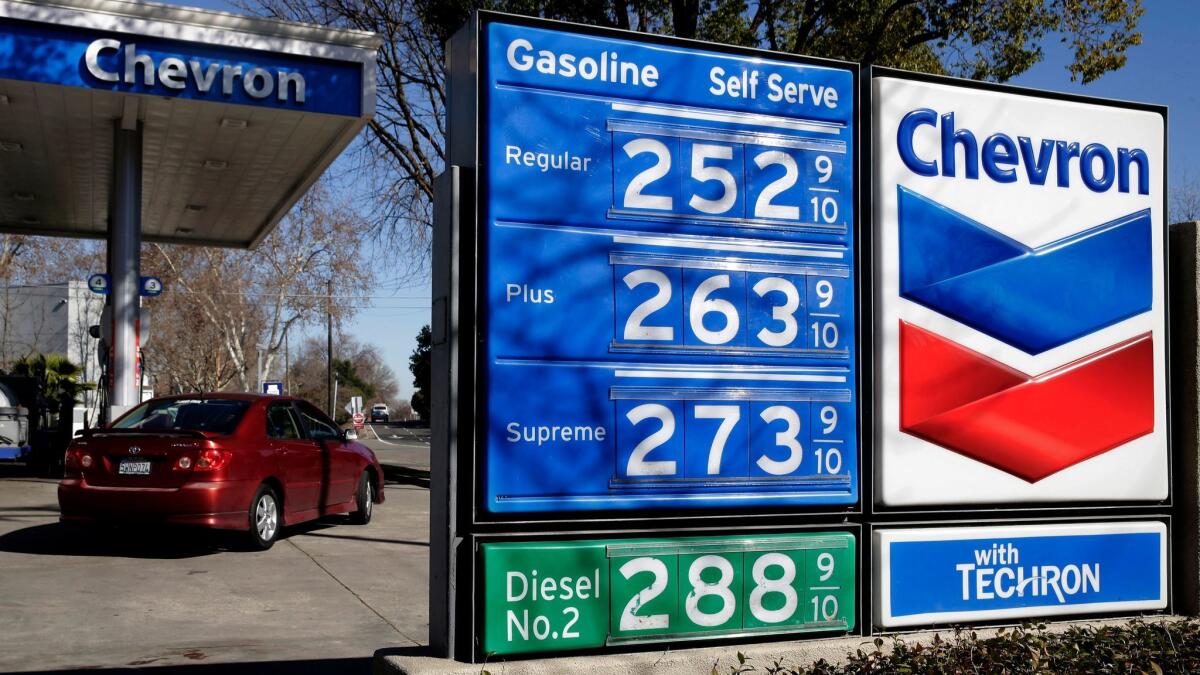Editorial: Republicans are playing politics with the gas tax again. No wonder they have no power in California

- Share via
Assemblyman Travis Allen (R-Huntington Beach) has hitched his political star to the campaign to repeal the “gas tax” — a package of vehicle fees and fuel taxes that the Legislature passed earlier this year to raise $52 billion over 10 years for transportation projects. The little-known legislator from Orange County launched a citizen’s initiative to repeal the fuel taxes and fees in May. In June, he announced his candidacy for governor in 2018.
Meanwhile, in Orange County, the California Republican Party has been working intensely to recall first-term state Sen. Josh Newman (D-Fullerton). What’s their argument against him? That he voted for the gas tax.
Other Republican politicians also have jumped on the bandwagon, including former San Diego City Councilman Carl DeMaio, who is pushing the repeal idea on a radio show he hosts.
Republicans are exaggerating the significance of this relatively minor tax hike in a state that faces much more significant problems.
But don’t be fooled. The campaign by Republicans to punish supporters of the gas tax is really just the latest tactic in their war to wipe out with the Democratic supermajority in the state Senate and revive their own declining influence in state government. After all, the gas tax package passed with the votes of 81 legislators — only one of whom was a Republican.
If this strategy rings familiar that’s because a similar campaign to stop the “car tax” contributed to the recall of Democratic Gov. Gray Davis in 2003 and boosted the political careers of several Republicans, including Arnold Schwarzenegger. Davis’ crime, in the eyes of voters, was that he had raised vehicle fees from $70 a year to about $210 to cover a hole in the state budget. The electricity crisis from few years earlier also played a role in the recall campaign, but in the end, the car tax in this car-loving state was a more powerful campaign slogan even than rolling blackouts.
Of course, there’s nothing unusual about Republicans seeking to win elections by attacking tax hikes. But it is cynical and destructive for them to make “stop the gas tax” the centerpiece of their political campaigns in the 2018 election. The package of fuel taxes and fees passed earlier this year represents an overdue investment in the state’s crumbling infrastructure. Even most Republicans agree that the state’s transportation system is in sorry shape from years of inadequate construction and maintenance. And that’s no wonder, considering that the gasoline tax hasn’t been raised in nearly three decades — not since a bipartisan deal in 1989 supported by Republican Gov. George Deukmejian as an important investment in the state’s economic future.
What’s more, Republicans are exaggerating the significance of this relatively minor tax hike in a state that faces much more significant problems. Politicians should be talking about income inequality, affordable housing and the dangers of Trump’s anti-immigrant policies to California residents, for starters. Or the congressional healthcare proposal that will force millions of people to lose coverage. Or the constant threat to California’s natural resources — its mountains, deserts, oceans, wildlife and air — from the environmentally hostile federal government.
It’s hard to imagine that the prospect of paying $10 more a month to finally fix the state’s roads and bridges, which are in observably bad shape, and build public transportation projects for future traffic relief, even ranks on the same outrage scale as these critical California issues.
Will the Republicans’ gas tax ploy work? Possibly not. The political landscape has changed a lot since 2003, when 35% of California voters were registered Republican and the GOP still wielded some power in Sacramento. Since then, Republican registration has dropped steadily by about 400,000 even as the state’s population has grown. Now, only about a quarter of the state’s voters are registered Republican, and the GOP holds not one statewide office. Historically, Republican enclaves such as Orange County and northern San Diego County have turned purple, and in 2018, Republicans are expected to face tough challenges to retain congressional seats.
The reason the party of Ronald Reagan is becoming increasingly irrelevant is because it continues to back the wrong issues and demonize the very people it needs to attract to remain relevant in California.
Follow the Opinion section on Twitter @latimesopinion and Facebook
More to Read
A cure for the common opinion
Get thought-provoking perspectives with our weekly newsletter.
You may occasionally receive promotional content from the Los Angeles Times.









